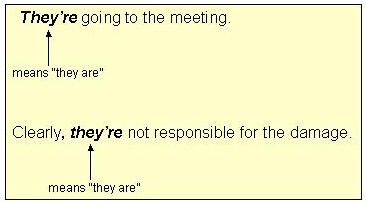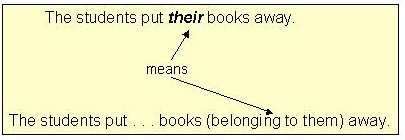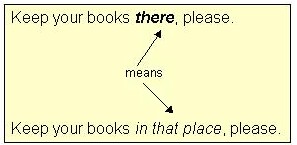
They're, there, and their may be the most frequently confused sound-alikes in the English language.
The explanations below should help you use these words correctly.
They're is a contraction for they are.
Use they're only when you mean they are.
Examples of they're used in sentences

Remember: Use they're only when you mean they are.
Their is the possessive form of the personal pronoun they.
Their means "belonging to them" and should be used only to show ownership.
Their should always be followed by the name of the thing that belongs to them.
Example
![]()
In this example, a house is the thing that belongs to them.
Their indicates that the house belongs to them.
Example of their used in a sentence

If you remove the t from their, you are left with the word heir.
An heir is someone who has inherited something, someone to whom something now belongs.
There has two meanings:
1. There can mean in that place.
Example

A good way to associate this spelling - there - with the meaning - in that place - is to think of removing the t from the beginning of the word.
What remains is the word here, a word that also indicates a place.
2. When there is followed by a verb of being (is, are, was, were, has been, etc.) before the subject of the sentence, there is an expletive (simply a filler word).
Examples of there followed by different tenses of the verb of being:



NOTE: When there is an expletive, it always comes before the subject of the sentence.
There is never the sentence subject.
Link to exercises on they're, their, and there.